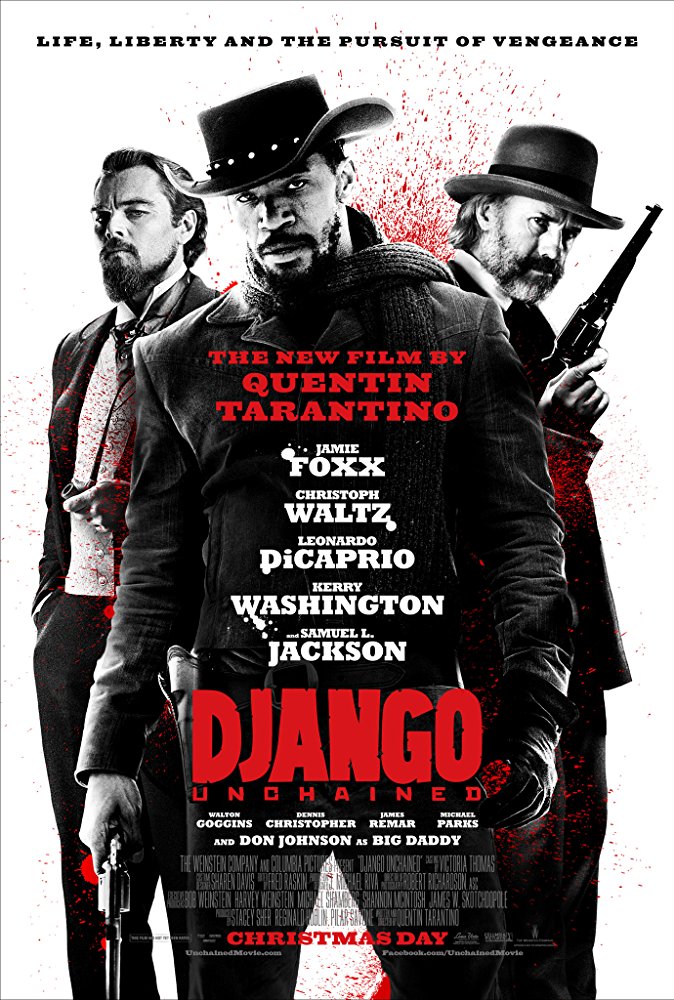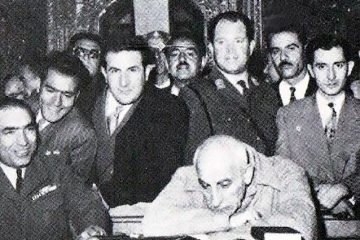Django Unchained
Director: Quentin Tarantino
Writer: Quentin Tarantino
Starring: Jamie Foxx | Christoph Waltz | Leonardo DiCaprio | Kerry Washington | Samuel L. Jackson | Walton Goggins | Dennis Christopher | James Remar | Michael Parks | Don Johnson
Production Companies: A Band Apart | Columbia Pictures
Distributed by: The Weinstein Company
R | 165 min | Drama, Western | 2012 | USA

Synopsis (story spoiler)
In 1858 in Texas, the speck brothers, Ace and Dicky, march a bunch of slaves. Among them is Django, sold off and separated for his wife Broomhilda von Shaft, a house servant and slave who speak both English and German. Dr. Schultz, a German-born dentist, goes to Django to identify their faces at the cost of identifying three now-award-winning brothers, then he makes Django his partner, and this slave is a talented shooter.
After a while, the two tend to rescue their new owner, Candie, to save Broomhilda (Django’s wife), and the man forces Schultz to buy a maid which basically are slaves for $ 12,000 in the middle of the dinner that was being held. He then kills Candie and after that is immediately knocked out by someone else. Django draws his gun and launches a bloodbath, but is forced to surrender when his wife is taken hostage by one of Candie’s men.
Candie’s sister then decides to sell Django to a miner to torment him, but he tricks his caretakers and soon escapes, returns to Candie’s farm, kills them all, saves Broomhilda and eventually escapes with her.
The History and Story Analysis of the Movie
Before the abolition of slavery, the slaves did not have any human right. In many cases, even the basic rights that were given to animals, such as allowing a mother taking care of their own child, were denied. Slave owners owned the lives and property of black slaves, and raping and being murdered by their white masters were very common, and no law or rules protected any of the black slaves. Slaves had to serve their white masters as long as they were breathing. Eventually slavery was abolished because of the interference it had created in the path of American industrialization.
Numerous films have been made about the lives of black slaves. Although it is difficult to find a film that is exactly according to the facts recorded in history, Tarantino is no exception.
Although the film is about the immense and intensive oppression of the white on black slaves, Tarantino’s portrayal of the black people does not look pretty or right.
One of the main ones is that most of the film’s blacks are “aggregated”. Except Django and Stephen, the film’s cast is extremely “tamed” and “undefined.” They are to be “merely oppressed”, and not to protest for a moment! The black women of the Candie mansion are extremely stupid and mindless.
The level of racial insults in the film is so high that Spike Lee said that he would never watch the film because the film insulted his ancestors, in an interview to a Hollywood Reporter.
In addition, subtle sarcasm is leveled at the past of black Americans to show that part of the guilt and accusation of slavery goes back to them. Because blacks in Africa themselves sold their own color people to Westerners, and in the beginning, whenever they found themselves in a small position, they took severe revenge on whites, which in some cases wasn’t logical at all.
The precise image of this approach is in the character of Stephen (Samuel Jackson), who works as a trusted slave for Calvin Candie on the farm. He is a well-dressed person and has a lot of influence on the people of this house. And he treats other slaves worse than the white racists because he betrays his fellow races.
In fact, it can be said that in films made about the situation of black people during slavery, it is difficult to find images and scenes that correspond to the facts recorded in history, or that the intensity and amount of the oppression on the black people is correctly shown. In such works, the charge of racial crimes is divided between blacks and whites, and on the other hand, there is usually a white savior who works for the rights of blacks.



0 Comments